
Lubricant, base stock and additive companies are doing a good job of communicating their sustainability efforts to employees, according to a new survey by Lubes’n’Greases.
Public companies have faced mounting pressure from investors such as Blackrock, the world’s largest asset management company, to minimize environmental impact, implement social responsibility projects and improve corporate governance standards. These companies are in turn asking their suppliers to improve operational sustainability.
The first Lubes’n’Greases survey on perceptions of sustainability asked more than 700 people whether they thought their company and the industry as a whole were actively engaged in sustainable business practices in three main areas: the environment, social wellbeing and corporate governance.
Overall, most respondents perceived their company outperformed the industry in these three areas. While 77% said their company tries to reduce energy consumption, greenhouse gas emissions and water use, 69% thought the same of the wider industry.
Reducing a company’s overall carbon footprint can be challenging as what they produce is from a hydrocarbon base stock. However, about 30% of global energy production is lost each year to friction, wear and corrosion. Lubrication therefore makes a substantial contribution to reducing energy demand and fuel consumption for users, known as the carbon handprint, by reducing friction, wear and corrosion and increasing the lifespan of machinery.
“However, this is not and will not be sufficient in the future for lubricant manufacturers to generate and maintain their profit, as pressure and purpose are increasing. The lubricants industry needs to make progress to measure, manage and modify its own corporate carbon footprint, which it leaves behind, while making its lubricants,” as Germany-based independent sustainability adviser Apu Gosalia told Sustainability InSite.
“Decarbonization must be done along a lubricant manufacturer’s entire process and value chain, together with the raw material suppliers, as they account for around 90% of the product carbon footprint of a finished lubricant,” Gosalia explained.
“The lubricants industry actively practices environmental sustainability.”
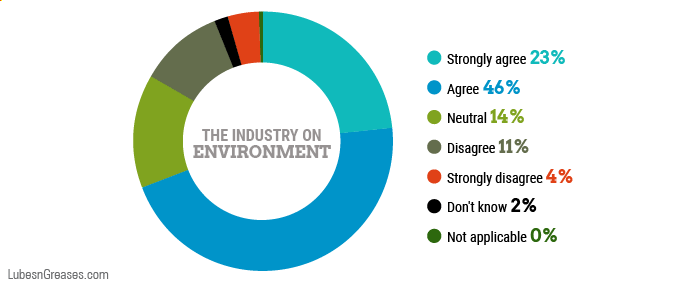
“My company actively practices environmental sustainability.”
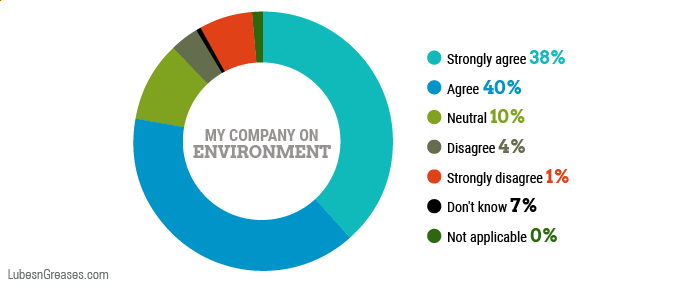
The difference in perceptions between company and industry performance on environmental issues was the narrowest of the three pillars. It widened when respondents were asked about social issues, with 79% of them saying their company actively practices social sustainability and 59.5% thinking the lubricants industry was doing so.
“My experience on why companies are socially engaged – both internally regarding employees and externally in terms of corporate citizenship – is because they either want to be or they have to be,” said Gosalia. “Generally speaking, mission statements, stakeholder expectations and demands from society and non-governmental institutions are setting clear guidelines and frameworks on how and what companies should do to engage socially towards their own employees, but also towards society in an appropriate way.”
“The lubricants industry actively practices social sustainability.”
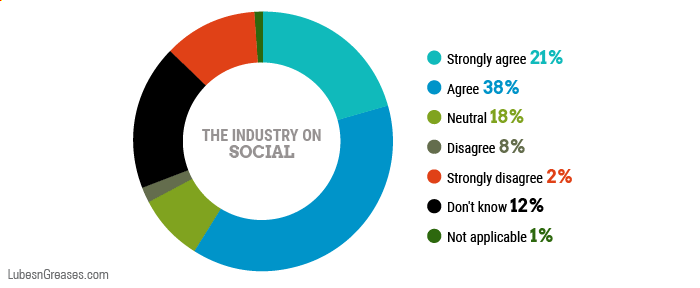
“My company actively practices social sustainability.”
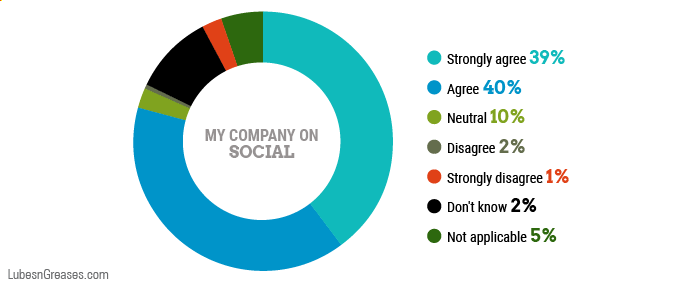
The greatest difference in respondent perceptions was in sustainable governance, with 71.6% saying their employers actively practiced sustainable corporate governance and 47% thinking the same of the lubricants industry as a whole. This suggests that employees’ think their companies are doing better than their peers, where there is much room for improvement with diversity, ethics and transparency.
As with much of the hydrocarbons and chemicals industries, men make up most of the workforce, especially at the management level, according to the Lubes’n’Greases Workplace Trends Report. However, the same report also found that diversity was not a top concern, even among women. The number one concern was the industry being slow to adapt to change.
“The challenges the lubricants industry is facing, especially in the past months due to the pandemic and even before – in the form of digitalization, electric vehicles and decarbonization – forces it to quickly adapt to change and come up with sustainable solutions,” said Gosalia.
“The lubricants industry actively practices governance sustainability.”
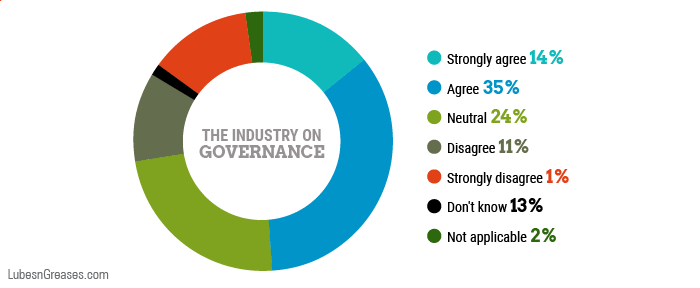
“My company actively practices governance sustainability.”
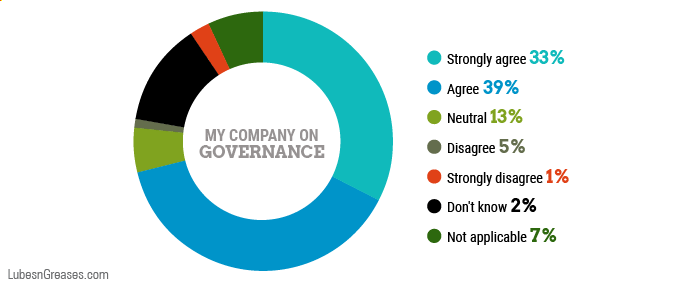
The Lubes’n’Greases perceptions of sustainability survey captured an even distribution of company revenue levels – 38.06% earned less than $10 million, 31.05% were between $10 million and $100 million and 30.88% were greater than $100 million. Almost half of respondents, 44.57%, work for lube blenders or marketers, while 15.88% have business that focuses on end users.
The survey was conducted in tandem with the launch of a new web-based resource called Sustainability InSite. Sustainability InSite is an in-depth look at how environmental, social and corporate governance sustainability are affecting the lubricants industry. It also offers insights into what companies need to do to respond to this seismic shift in business.
The survey defined environmental sustainability as trying to reduce energy consumption, greenhouse gas emissions and water use; implementing measures to reduce waste through reuse and recycling; and mitigating impact through innovation with things like feedstock and packaging. Social sustainability was ensuring equality as part of hiring and labor practices; valuing relationships with surrounding communities and end users; and sourcing raw materials from places that do not violate human rights. Corporate sustainability was running the business transparently and ethically, encouraging diversity in the board room and compensating executives fairly.

Sorry, a technical error occurred and we were unable to log you into your account. We have emailed the problem to our team, and they are looking into the matter. You can reach us at cs@lubesngreases.com.
Click here link to homepage